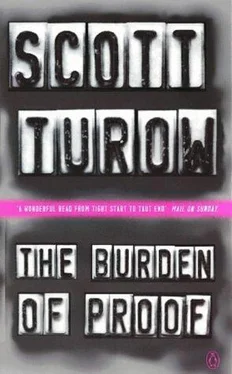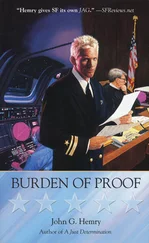Scott Turow - The Burden of Proof
Здесь есть возможность читать онлайн «Scott Turow - The Burden of Proof» весь текст электронной книги совершенно бесплатно (целиком полную версию без сокращений). В некоторых случаях можно слушать аудио, скачать через торрент в формате fb2 и присутствует краткое содержание. Жанр: Детектив, на английском языке. Описание произведения, (предисловие) а так же отзывы посетителей доступны на портале библиотеки ЛибКат.
- Название:The Burden of Proof
- Автор:
- Жанр:
- Год:неизвестен
- ISBN:нет данных
- Рейтинг книги:3 / 5. Голосов: 1
-
Избранное:Добавить в избранное
- Отзывы:
-
Ваша оценка:
- 60
- 1
- 2
- 3
- 4
- 5
The Burden of Proof: краткое содержание, описание и аннотация
Предлагаем к чтению аннотацию, описание, краткое содержание или предисловие (зависит от того, что написал сам автор книги «The Burden of Proof»). Если вы не нашли необходимую информацию о книге — напишите в комментариях, мы постараемся отыскать её.
The Burden of Proof — читать онлайн бесплатно полную книгу (весь текст) целиком
Ниже представлен текст книги, разбитый по страницам. Система сохранения места последней прочитанной страницы, позволяет с удобством читать онлайн бесплатно книгу «The Burden of Proof», без необходимости каждый раз заново искать на чём Вы остановились. Поставьте закладку, и сможете в любой момент перейти на страницу, на которой закончили чтение.
Интервал:
Закладка:
"Oh, they won't put you in jail. They all think you walk on water.".
Dixon, I insist."
"Me, too."
"I must withdraw, then, as your lawyer."
Dixon took a moment with that.
"So withdraw," he said at last. He adjusted his shoulders with a practiced groan, hoisted the safe again. txon, you are committing a federal offense right before my eyes. And one in which I am implicated. You are forcing me to notify the government."
Dixon, near the door, glanced back over his shoulder with a sullen, challenging darkness.
"Dixon, I mean it." Stern reached for the phone and dia/ed the U.S.
Attorney's Office. At this hour, they were unlikely to answer. "Sonia Klonsky," said Stern into the instrument, while in the earpiece he continued to. hear the ring.
By the door, Dixon dropped the safe; he was red-faced, heaving for breath. As Stern replaced the phone, Dixon waved a hand disgustedly. He took a step out, then came back to the sofa and stuffed his cigarettes and his keys into a pocket of his sport coat. He shook a finger at Stern, but he did not yet have enough breath to speak, and left without another word.
STERN had agreed to meet his children at the Bygone, one of those clever chain restaurants plunked down by their corporate parents at commercially S availing spots in every major city in America. The one in Dallas looked just like the one in the tri-cities-the same old cast-iron lampposts, bell jars for bar glasses, and little girls' trading cards with pictures of kittens cutely cemented under the urethane tabletops. The restaurant stood on a bluff overlooking the network of highways near the Greater Kindle County Airfield. Stuck in traffic, Stern could see it miles away.
The airport now was what the river had been to Kindle County a century ago, a point of confluence for the vast urges of commerce. Great office buildings-rhomboid shapes of shining glass-had risen in what were hayfields only fifteen years before; enormous warehouses with corrugated doors and various chain hotels constructed of pre-formed concrete stood at the roadside, and the highway was heavily posted with signs for other projects that would be under development to the end of the century. The traffic at all hours was thick. Stern, stalled intermittently, snapped off the radio in the Cadillac so he could give vent to various thoughts about Dixon.
Perhaps, Stern thought, tracing the trouble back to its roots, if Silvia had felt more secure in the aftermath of their mother's death, she would have found Dixon less compelling. Stern had done his best, planned carefully for both of them. He sold some of his mother's furniture and two rings to raise capital, and by the following fall, Easton University, the pastoral haven of privileged education in the Middle West, became the refuge of the, orphaned Sterns. Silvia, a gifted student, ahead of herself in school like her brother, enrolled in the college on a full scholarship; he attended law school on the G.I. Bill.
Stern for the sake of economy, and continuity, lived in their mother's apartment in Du-Sable, riding the train downach morning, while Silvia was soon invited to join a sorority.
For financial support, Stern resumed the punchboard route he had driven throughout college. The punchboards were minor attractions utilized by small-town merchants; for a dime a chance, customers poked tiny paper rolls out of the board and read a joke or, far less often, word they had won a washer or a TV. On Friday mornings, Stern loaded new boards and the prizes won a week before into the aging track his boss Milkie provided him, and rambled in fourth gear along the prairie highways, visiting the small-town stores to make his deliveries and split the fees. By the time he returned to the tri-cities late Sunday, Silvia had taken the train up and was in their mother's apartment preparing dinner.
These were rewarding, expansive moments, coming off the road with the dust of several states on his suit, and he looked forward to his sister's company, their hours as a family of two.
One Sunday night he turned the key and found Silvia seated at the dining-room table with Dixon Hartnell, who was still in uniform. Passing through the city on leave, he had searched out Stern's address and Silvia had let him in.
She claimed to have remembered Dixon's name, but there was no way to be sure. Silvia was smitten with all of Stern's law school friends, and from the first moment you could see that these two young, goodlooking people were intent on each other.
Stern was horrified to find Dixon, long consigned to the past, beside his precious sister. Dixon still had the fiossy gleam of a cheap suit, and having been shot at in Korea, having served as the commander of other men, he was if anything more brash. Stern treated him correctly, and sent him on his way after dinner, fairly certain they would not see him again.
Dixon's correspondence with Silvia began properly enough with a note thanking his hostess for dinner. It never occurred to Stern to suggest she not answer. Eight months later, when Dixon appeared again, mustered out and enrolled at the U., it had become a romance. Stern had never been Silvia's disciplinarian and he was at a loss as to how to put an end to this disastrous relationship,,though he bristled with disapproval whenever the two were together in his presence and barely spoke to Dixon. Finally in Silvia's junior year, a crisis erupted.
Stern forbade her to transfer to the U. to be with Dixon. She accepted this edict with typical silent distress, but three months later they announced marriage plans. Silvia and Dixon countered every irate objection Stern raised: Dixon would convert to Judaism; Silvia would not have to leave college; Dixon, indifferent to school anyway, would drop out and take a job with a brokerage house. Stern, longsuffering, denounced Dixon at length: a huckster; a fake; an illusion. They remained resolute. One Sunday night, Dixon appeared at dinner and begged Stern to attend the wedding: he would both give away the bride and be the best man. 'We can't do this without you,' Dixon said. 'We're the only family each of us has got."
When Dixon completed his conversion course, Silvia and he were married beneath a canopy. Stern stood immediately behind the bride and groom.
He began weeping halfway through the ceremony and could not stop. He.had not carried on like that in front bf others before or since, but his circumstances had overpowered him: he was twenty,four old now and utterly alone. His search for a wife, never a matter of conscious priority, started at that moment.
As for Dixon and Silvia, there was no saying years later who was right and. who was wrong. Silvia relished the comforts time provided and Dixon's almost celestial admiration of her; but her pain, particularly with her husband's wandering, was sometimes intense. Given the histoi-y, she never dared speak against him to Stern, except during that short period several years ago vhen Dixon was banished from the household. One evening then, Stern had come home and found Silvia and Clara at the dining table. There was a sherry shifter between them and he could tell from Clara's warning look that SOmething was amiss.
Red-eyed and tipsy, Silvia spoke at once to her brother.
"I always thought it was all because he wanted children so badly," she said, offering her own explanation for Dixon's wanderlust. That barrenness, which the doctors could not explain, was Silvia's heartbreak in those years; she talked of it often to Clara, but only in private, for Dixon was far too humiliated by their failure to bear the thought that anyone else knew. "But he's taking advantage," said Silvia. "He always has..I did not even realize he had been lying to the rabbi until he took off his pants on our wedding night."
Tlis remark seemed entirely mysterious at first, 'and then deeply shocking. The revelations seemed to ripple off, not around Silvia, but about Stern himself. He was being informed of something deeply telling, yet he could not read the message. By then he had engaged in dozens of athletic competitions with Dixon, stood with him time and again in various club locker rooms. Dixon did no fan dance; the fact, as it was, was plainly displayed. He must have assumed that among men, creatures of the here and now, this cen-turies-old ritual could be disregarded as brutal or pass6.
Читать дальшеИнтервал:
Закладка:
Похожие книги на «The Burden of Proof»
Представляем Вашему вниманию похожие книги на «The Burden of Proof» списком для выбора. Мы отобрали схожую по названию и смыслу литературу в надежде предоставить читателям больше вариантов отыскать новые, интересные, ещё непрочитанные произведения.
Обсуждение, отзывы о книге «The Burden of Proof» и просто собственные мнения читателей. Оставьте ваши комментарии, напишите, что Вы думаете о произведении, его смысле или главных героях. Укажите что конкретно понравилось, а что нет, и почему Вы так считаете.












